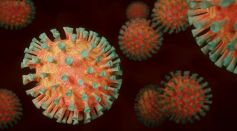Tags: Coronavirus

COVID-19 Face Mask Glows to Tell If You're Positive with the Virus

Cardiovascular Illness Confirmed As Long-COVID Symptoms; Shortness of Breath Found Persistent in Coronavirus Survivors

China Develops Humanized Pigs to Simulate COVID-19 Infection for Future Testing of Vaccines and Drugs

Fetal Brain Development Not Affected by Coronavirus Even if Mothers Tested Positive With COVID-19 During Pregnancy

Lung Transplant on the Rise: Experts Weigh in Whether to Allocate Scarce Resource to Those Who Chose to Not Get Vaccinated

Smoking Reduce Signaling Ability of Cytokines That May Lead to Severe COVID-19, Stanford Researchers Found

Over 10% of COVID-19 Patients Can Develop Eye or Ear Problem, Latest Data Suggests

Severe Acute Respiratory Syndrome: Is It Possible for COVID-19 Infection to Spread From Livestock to Humans?

Snow Leopards in Lincoln Children's Zoo Died One Month After Testing Positive with Coronavirus

UK Confirms First Dog Tested Positive for COVID-19: Experts Explain Mode of Infection, Symptoms to Look For

Europe Experiencing New Phase of COVID-19 Infections: WHO Warns the Continent Is Now Back at the Epicenter

TAU Researchers Discovered COVID-19 Proteins That Harm Blood Vessels; Information Could Be Used to Develop New Treatment

White-Tailed Deers in Iowa Tested Positive for COVID-19; Human Spit Possible Cause of Transmission
Oxford Scientists Found Gene in South Asian Ancestry That Doubles the Risk of Dying From COVID-19 Complications

COVID-19 Found to Infect Neurons Through Nose, Passing Blood Barrier and Causing Brain Fogs

New COVID-19 Delta Variant Subtype Confirmed in UK; AY.4.2 More Transmissible

Tuberculosis Spreads Like COVID-19; New Research Shows 90 Percent of TB Bacteria Transmits Through Droplets

Individuals Not Affected by COVID-19 May Have Natural Resistance Encoded in Genes
Moderately Ill COVID-19 Patients At Risk For Dangerous Blood Clots But High-Dose Anticoagulant Can Help Prevent Condition

COVID-19 Delta Variant Don’t Put Children at Risk for More Severity; Kids More Affected With Alpha Strain
Most Popular

Tree Communication Explained: How Underground Fungi Networks Connect Entire Forests

Space Tourism Future: How Commercial Space Travel Will Transform Civilian Exploration

How Space Observation and the Solar Light Spectrum Make the Sun Look Different in Space Than on Earth

Universe Origin Revealed: Exploring the Latest Big Bang Science Theories and Discoveries




